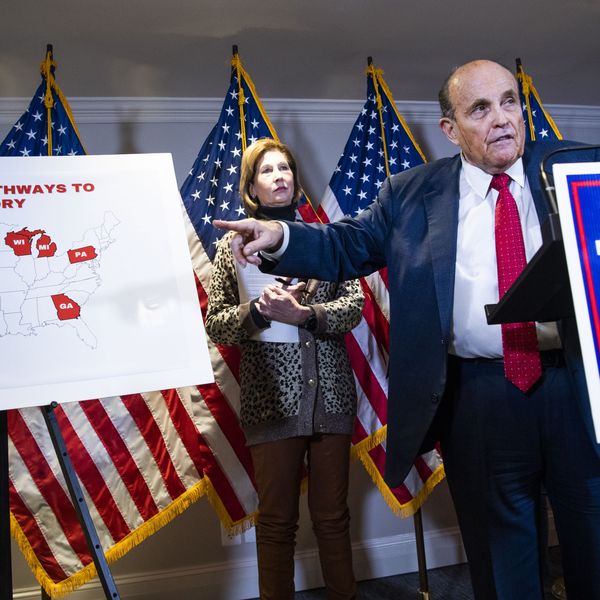
People protest against U.S. President Donald Trump in front of the White House on July 11, 2017 in Washington, D.C. (Photo: Mark Wilson/Getty Images)
Absolving Trump Means Erasing the Harm Done to Millions
The call to coddle Trump—like the same outlets’ insistence that it would be mean to send bankers whose fraud derailed the economy to jail—is evidence of the total divorce between real people’s lives and experiences, and the puppets and caricatures in media’s narrative.
Disturbing as it is to see politicians and pundits advising a Biden administration to vehemently reject progressive policy goals, there's more. As Eoin Higgins notes in a piece for Business Insider (10/30/20), a concurrent strain of argument is that Trump himself should face no real public reckoning. Higgins cites a column by historian Jill Lepore in the Washington Post (10/16/20)--heralded as "eloquent" by the New York Times' Nicholas Kristof (Twitter, 10/18/20): "Let History, Not Partisans, Prosecute Trump."
Lepore, a Harvard professor, says it would be inappropriate to have a reconciliation commission like other countries have had; Trump's "wrongdoing" instead "should be investigated by journalists, chronicled by historians and, in some instances, tried in ordinary courts." How those courts can adequately address such "wrongdoing" as allowing, through corruption and mismanagement, the deaths of hundreds of thousands of people is unclear. Her moral point is, though: "Many Trump critics will find this suggestion maddeningly insufficient," Lepore notes, but chides "the appetite for vengeance is a symptom of the same poison."
The call to coddle Trump--like the same outlets' insistence that it would be mean to send bankers whose fraud derailed the economy to jail--is evidence of the total divorce between real people's lives and experiences, and the puppets and caricatures in media's narrative. There is no accountability to the millions of people who lost their lives, their loved ones, their homes, their jobs. Then as now, protecting the status quo involves marginalizing calls for justice, by portraying them as an "emotional" desire for "vengeance," better tempered by cooler heads.
"Higher capital requirements may not satisfy blood lust the way a CEO in chains would," wrote the Washington Post (9/12/13) in 2013, "but they're going to do a lot more." At the New York Times (2/25/11), it was: "You're entitled to wonder whether any of the highly paid executives who helped kindle the disaster will ever see jail time. The harder question, though, is whether anybody should."
The call to let Trump go gently also evokes the call not to prosecute those who committed acts of torture for the US--purporting to be some sort of healing gesture about "looking forward, not back," while in fact preserving the conditions that led to the horrors. Now as then, doing what we're told is the dry-eyed, grown-up thing to do involves erasing the real harms done to real people. That's not "politic," or "pragmatic"--it's perverse.
An Urgent Message From Our Co-Founder
Dear Common Dreams reader, The U.S. is on a fast track to authoritarianism like nothing I've ever seen. Meanwhile, corporate news outlets are utterly capitulating to Trump, twisting their coverage to avoid drawing his ire while lining up to stuff cash in his pockets. That's why I believe that Common Dreams is doing the best and most consequential reporting that we've ever done. Our small but mighty team is a progressive reporting powerhouse, covering the news every day that the corporate media never will. Our mission has always been simple: To inform. To inspire. And to ignite change for the common good. Now here's the key piece that I want all our readers to understand: None of this would be possible without your financial support. That's not just some fundraising cliche. It's the absolute and literal truth. We don't accept corporate advertising and never will. We don't have a paywall because we don't think people should be blocked from critical news based on their ability to pay. Everything we do is funded by the donations of readers like you. Will you donate now to help power the nonprofit, independent reporting of Common Dreams? Thank you for being a vital member of our community. Together, we can keep independent journalism alive when it’s needed most. - Craig Brown, Co-founder |
Disturbing as it is to see politicians and pundits advising a Biden administration to vehemently reject progressive policy goals, there's more. As Eoin Higgins notes in a piece for Business Insider (10/30/20), a concurrent strain of argument is that Trump himself should face no real public reckoning. Higgins cites a column by historian Jill Lepore in the Washington Post (10/16/20)--heralded as "eloquent" by the New York Times' Nicholas Kristof (Twitter, 10/18/20): "Let History, Not Partisans, Prosecute Trump."
Lepore, a Harvard professor, says it would be inappropriate to have a reconciliation commission like other countries have had; Trump's "wrongdoing" instead "should be investigated by journalists, chronicled by historians and, in some instances, tried in ordinary courts." How those courts can adequately address such "wrongdoing" as allowing, through corruption and mismanagement, the deaths of hundreds of thousands of people is unclear. Her moral point is, though: "Many Trump critics will find this suggestion maddeningly insufficient," Lepore notes, but chides "the appetite for vengeance is a symptom of the same poison."
The call to coddle Trump--like the same outlets' insistence that it would be mean to send bankers whose fraud derailed the economy to jail--is evidence of the total divorce between real people's lives and experiences, and the puppets and caricatures in media's narrative. There is no accountability to the millions of people who lost their lives, their loved ones, their homes, their jobs. Then as now, protecting the status quo involves marginalizing calls for justice, by portraying them as an "emotional" desire for "vengeance," better tempered by cooler heads.
"Higher capital requirements may not satisfy blood lust the way a CEO in chains would," wrote the Washington Post (9/12/13) in 2013, "but they're going to do a lot more." At the New York Times (2/25/11), it was: "You're entitled to wonder whether any of the highly paid executives who helped kindle the disaster will ever see jail time. The harder question, though, is whether anybody should."
The call to let Trump go gently also evokes the call not to prosecute those who committed acts of torture for the US--purporting to be some sort of healing gesture about "looking forward, not back," while in fact preserving the conditions that led to the horrors. Now as then, doing what we're told is the dry-eyed, grown-up thing to do involves erasing the real harms done to real people. That's not "politic," or "pragmatic"--it's perverse.
Disturbing as it is to see politicians and pundits advising a Biden administration to vehemently reject progressive policy goals, there's more. As Eoin Higgins notes in a piece for Business Insider (10/30/20), a concurrent strain of argument is that Trump himself should face no real public reckoning. Higgins cites a column by historian Jill Lepore in the Washington Post (10/16/20)--heralded as "eloquent" by the New York Times' Nicholas Kristof (Twitter, 10/18/20): "Let History, Not Partisans, Prosecute Trump."
Lepore, a Harvard professor, says it would be inappropriate to have a reconciliation commission like other countries have had; Trump's "wrongdoing" instead "should be investigated by journalists, chronicled by historians and, in some instances, tried in ordinary courts." How those courts can adequately address such "wrongdoing" as allowing, through corruption and mismanagement, the deaths of hundreds of thousands of people is unclear. Her moral point is, though: "Many Trump critics will find this suggestion maddeningly insufficient," Lepore notes, but chides "the appetite for vengeance is a symptom of the same poison."
The call to coddle Trump--like the same outlets' insistence that it would be mean to send bankers whose fraud derailed the economy to jail--is evidence of the total divorce between real people's lives and experiences, and the puppets and caricatures in media's narrative. There is no accountability to the millions of people who lost their lives, their loved ones, their homes, their jobs. Then as now, protecting the status quo involves marginalizing calls for justice, by portraying them as an "emotional" desire for "vengeance," better tempered by cooler heads.
"Higher capital requirements may not satisfy blood lust the way a CEO in chains would," wrote the Washington Post (9/12/13) in 2013, "but they're going to do a lot more." At the New York Times (2/25/11), it was: "You're entitled to wonder whether any of the highly paid executives who helped kindle the disaster will ever see jail time. The harder question, though, is whether anybody should."
The call to let Trump go gently also evokes the call not to prosecute those who committed acts of torture for the US--purporting to be some sort of healing gesture about "looking forward, not back," while in fact preserving the conditions that led to the horrors. Now as then, doing what we're told is the dry-eyed, grown-up thing to do involves erasing the real harms done to real people. That's not "politic," or "pragmatic"--it's perverse.

